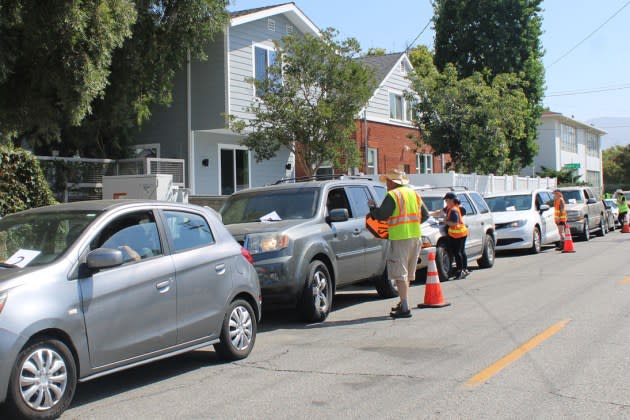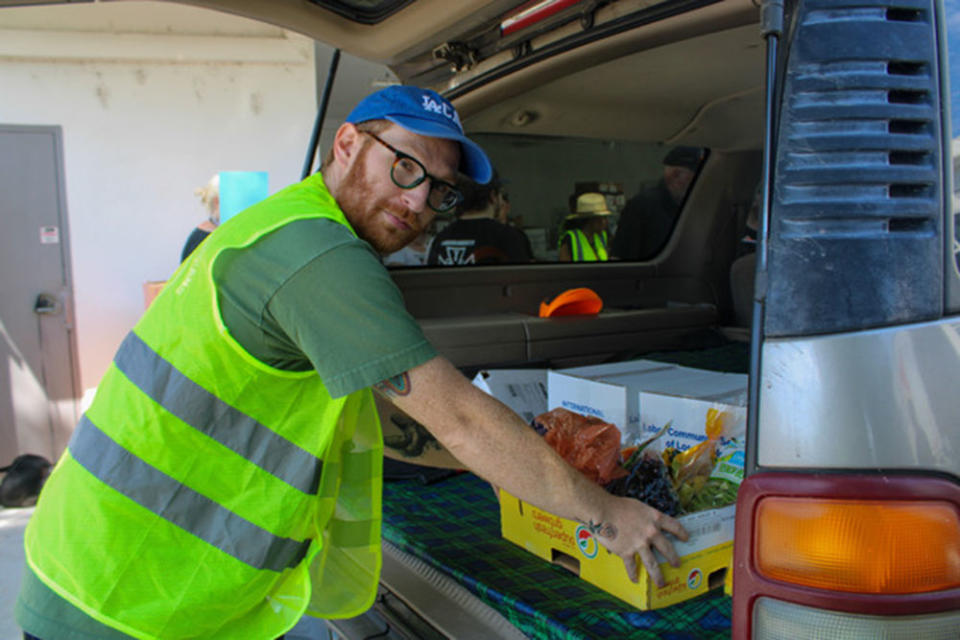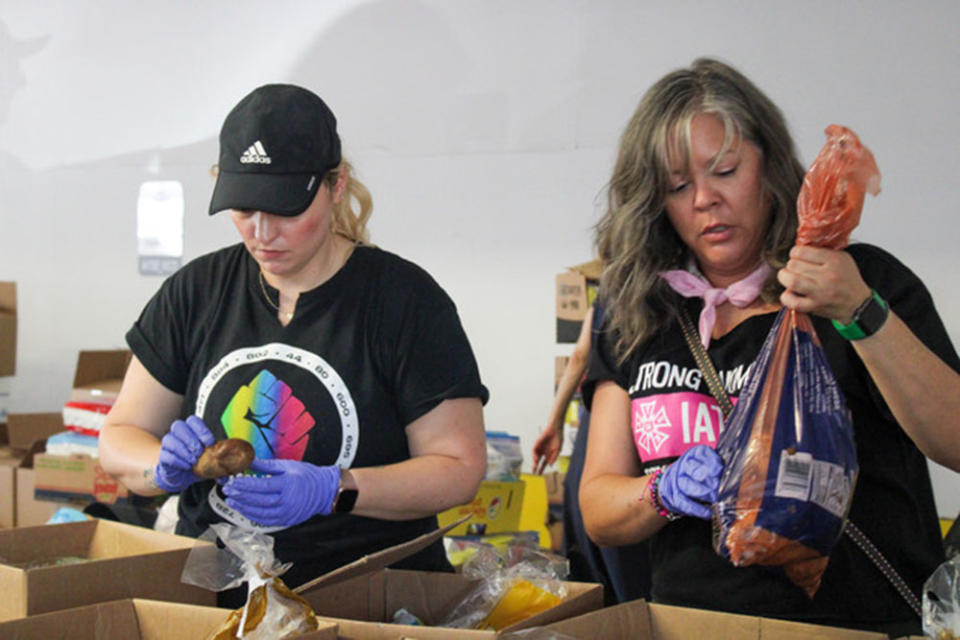Hollywood Food Insecurity Spikes Amid Strikes

The entertainment industry’s most vulnerable workers are increasingly unable to feed themselves amid a historic double strike with no clear end in sight, according to non-profits tasked with addressing the food insecurity crisis. They describe Hollywood’s ongoing work stoppage — prompted by the contractual impasse between the writing and acting guilds on one side and the Alliance of Motion Picture and Television Producers on the other — as a humanitarian emergency broadly affecting the community, not just striking union members.
The Los Angeles Regional Food Bank, which runs pantries for those in need throughout the county, attributes a meaningful portion of its nine percent uptick in year-over-year distribution to the strikes’ impact. “When income stops immediately, the demand rises very rapidly,” explains chief development officer Roger Castle.
More from The Hollywood Reporter
Writers Guild Tells Members That Studios May Not Be Serious About Restarting Talks to Make a Deal
American Playwriting Foundation to Give Out $10K Awards to WGA Members in Contest
“This is happening right after the pandemic, which drained a lot of people’s savings,” observes Keith McNutt, executive director at the Entertainment Community Fund, which has distributed $3 million to more than 1,500 workers as of Aug. 1. “So, you have the financial burden on people who’ve already been depleted.” As a result, his organization — whose donors include Seth McFarlane, Steven Spielberg, and Greg Berlanti — has seen an unprecedented wave of immediate requests for basic living expenses, including groceries. “Before this started, we would do about 50 grants out of the L.A. office a week. Now we’re getting 50 applications a day.”
On July 28, below-the-line unions IATSE and the Teamsters Local 399 held a drive-through food drive for industry members affected by the strikes at IATSE’s West Coast headquarters in Burbank. It drew about a thousand vehicles throughout the day.

According to the relief nonprofit Labor Community Services, which helped to organize the event and is planning another in August, the organization distributed 1,740 food boxes, feeding an estimated 8,700 people, that day.
In California, striking workers are ineligible to receive unemployment assistance, while nationally, they cannot receive SNAP food benefits unless they qualified pre-strike — something Sen. John Fetterman of Pennsylvania is aiming to change with a new bill, introduced July 27. One place that striking actors in particular can turn to for help during the work stoppage is the SAG-AFTRA Foundation, which offers emergency financial assistance and other resources, including grocery store gift cards, to union members. SAG-AFTRA made a seven-figure donation to the Foundation early in its strike to assist these efforts. (The WGA West does provide its own members with emergency financial loans from its strike fund and Good and Welfare fund.)
Cyd Wilson, its executive director, has seen an explosion in demand for the organization’s help. “People are making these decisions: Should pay my rent, or should I put food on the table? Should I put food on the table, or should I pay my utilities?” she explains. “There’s a great deal of suffering that’s happening.” By Wilson’s estimate, the foundation is now handling 40 times its typical number of applications per week, and it has already distributed as much in grants since the beginning of the WGA’s strike three months ago as it typically would in the span of a given year.
Meanwhile, Groceries for Writers, a direct aid project administered by Humanitas, a non-profit focused on film and television writers, has distributed more than 1,100 gift cards to WGA members since the onset of its work stoppage in early May. Humanitas executive director Michelle Franke says that “many of these writers have left notes indicating they’re in very urgent financial situations. Writers describe struggling with student debt, falling into eligibility gaps with CalFresh and EDD [state unemployment assistance], eviction notices, writing teams splitting low pay, having only just moved to Los Angeles and not having a large local support network as a consequence, dwindling savings.”
Groceries for Writers is hardly alone in addressing the growing need. In July, L.A.’s World Harvest Food Bank founder and CEO Glen Curado estimated to The Hollywood Reporter that his organization, which is offering free food to striking writers and actors, was serving an average of 150-200 members of this group per day. That effort was inspired by The Price Is Right host Drew Carey’s gesture of paying for all striking writers dining at Bob’s Big Boy in Burbank and L.A.’s Swingers Diner for the duration of the work stoppage.

THR asked both the AMPTP and the talent unions whether they bear any responsibility for the worsening situation. In a statement, a spokesperson for the AMPTP said: “Like those negotiating on behalf of the guilds, representatives from the AMPTP and its member companies came to the table in good faith, wanting to reach an agreement that would keep the industry working and prevent the hardships caused by labor strikes.” SAG-AFTRA didn’t respond to a request for comment, while a WGA spokesperson said in a statement: “The public knows that working people are putting everything on the line in order to negotiate a fair deal with the studios who have caused this strike and the resultant suffering by refusing to address the reasonable proposals that writers brought to the table over 90 days ago.” Neither the AMPTP itself nor any of its major studio and streamer members responded when THR asked if the companies or their philanthropic arms had made any contributions specifically to address the industry’s food insecurity crisis since May.
Support staffers — early-career workers who fill roles such as assistants and coordinators and tend to be low-paid — are especially at risk at this time. “So much of the compensation that they receive is, no one’s going to say it, but it’s implied to be food-based,” notes Liz Hsiao Lan Alper, the co-founder of advocacy group Pay Up Hollywood and a WGA West board member. Alper says that support staffers are often paid the “bare minimum” but access complimentary food through writers’ rooms, craft services on sets or in agency kitchens and conference rooms. And so, when the strikes occurred, the need was “overwhelming,” she explains: “It’s invisible compensation that just went away when the work stoppages happened.”
For that reason, on June 7 Pay Up Hollywood relaunched its COVID-19-era Hollywood Support Staff Relief Fund. So far, the fund has distributed around $45,000 in one-time financial need grants up to $1,000 apiece, according to organizer and support staffer Alex Rubin, who says she’s encouraged support staffers to obtain free food distributed on picket lines. “I think that there is a little bit of embarrassment and insecurity about not being able to feed yourself,” she says. “It is the reason why we give our grants as just like, ‘Here’s a one-time grant. You don’t have to tell us how you want to use this.’”
Helping people in entertainment with food during work stoppages is a “tangible message,” says James Costello, a Teamsters Local 399 driver and an IATSE Local 44 prop master, who was volunteering at IATSE’s July 28 food drive. A second-generation Teamster, Costello still remembers a union strike in the 1980s that prompted his parents to warn their children that their Christmas holiday would be affected that year, and the Teamsters emergency relief that arrived in the fall, offering groceries and a Christmas tree.
As the strikes drag on and both the WGA and SAG-AFTRA have yet to formally reprise negotiations with the AMPTP (although the Writers Guild is set to have a preliminary meeting with the studios’ organization on Aug. 4), the non-profits on the front lines of the industry’s food-insecurity crisis are girding themselves for a long period of need. SAG-AFTRA Foundation’s Wilson says it’s pursuing a “very aggressive fundraising strategy” to meet the demand. (Already, it’s netted over $15 million in emergency assistance from stars like George Clooney, Nicole Kidman, Matt Damon and Dwayne Johnson, who are donating $1 million or more apiece.)
The Entertainment Community Fund’s McNutt notes that pocketbook pain will outlast the current conflict. “Just because the strike ends, it doesn’t mean the need will end. Everyone doesn’t go back to work the next week. We’re going to be looking at this [elevated] level of need for months afterward.”
Best of The Hollywood Reporter

